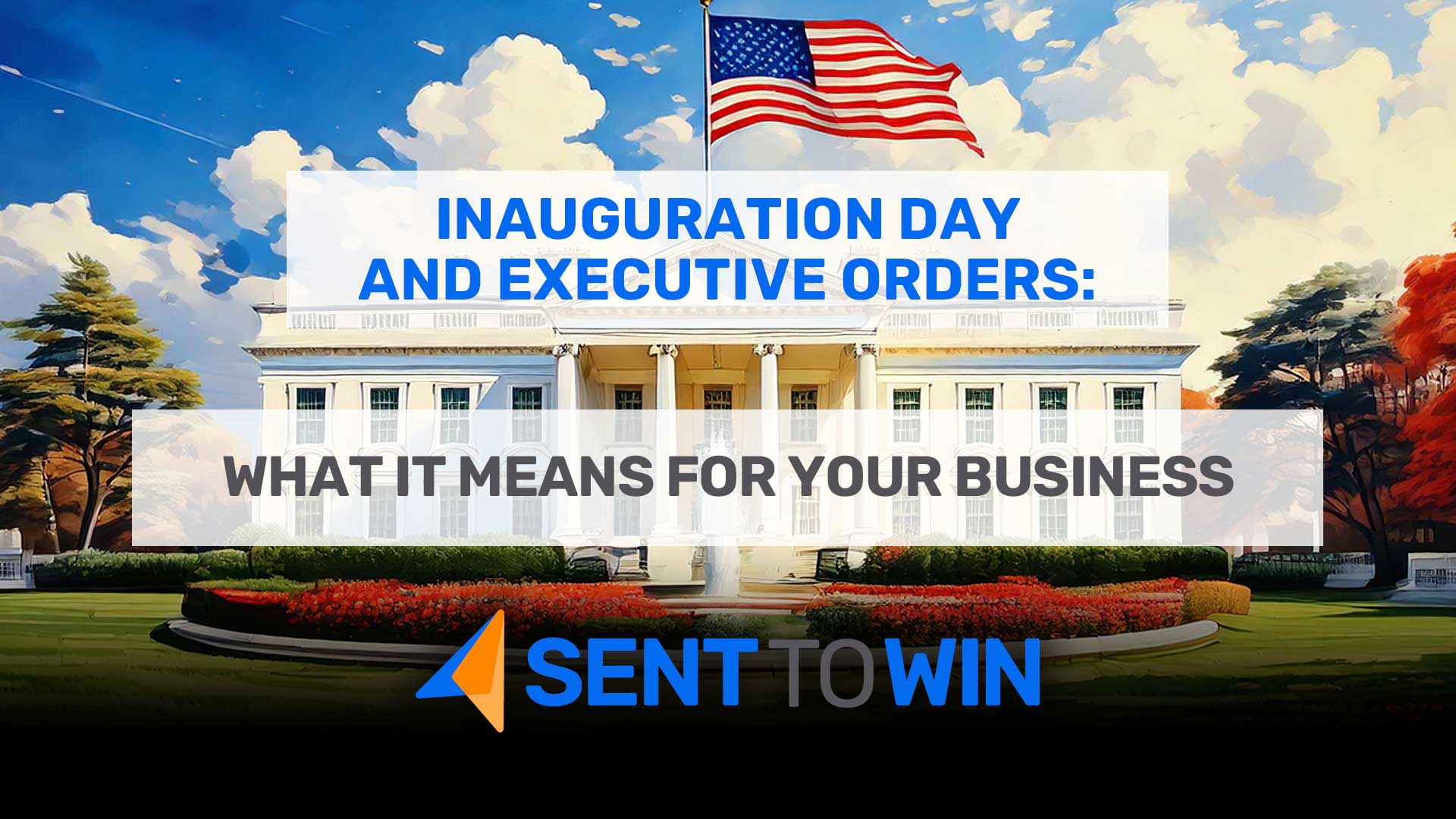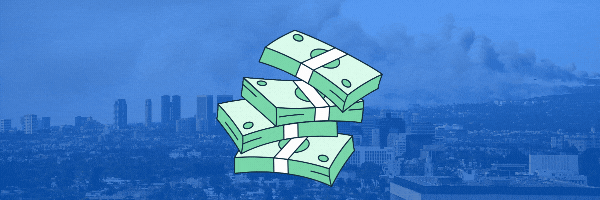Inauguration Day and Executive Orders: What It Means for Your Business
In today’s newsletter:
- Inauguration Day and Executive Orders: What It Means for Your Business
- Fire Insurance, Market Watch, and Inflation Update
- TikTok on the Clock: What’s Going on with the World’s Most Influential Social Media Platform?
This Monday, President Donald Trump was inaugurated as the 47th President of the United States, and as promised, he did not waste any time affecting policy. President Trump has spoken of enacting over 100 executive orders, directives, actions, and memoranda, so it can be a little hard to keep up. Today, we want to take this opportunity to report on some of the major orders President Trump has issued already, and how they might affect your business.
Since there are so many, we’ve broken them down into themes.
Energy Policy
For the second time (since President Biden reversed Trump’s action during his tenure), President Trump has removed the United States from the Paris Climate Accords, which would have placed limits on U.S. carbon emissions, among other things. Leaving the Paris Agreement also reportedly frees up the Trump administration to undo a lot of the Biden-era green-energy tax breaks, subsidies, and policy.
“We will drill, baby, drill,” the president said in a speech Monday. He seems to mean it. Trump has already taken steps to open up large swaths of public land in Alaska to oil drilling, and he also declared a national energy emergency, which will make it easier to finish pipelines, refineries, and to give permission to oil companies to extract from new sites. “We aren’t going to do the wind thing,” Trump said. In his comments, the president also mentioned changing federal policy toward electric vehicles (perhaps that means ending the EV tax credit) and revoking the “green new deal,” likely referring to Biden’s Inflation Reduction Act.
Oil prices have been up lately, and while some traders are optimistic about Trump’s current and forthcoming energy policies, others have mentioned that “contradictory changes” will likely come from his actions. For example, domestic oil production will likely increase, but new projects take time to bring online, and those effects may not be seen in the near future, while uncertain tariff policy and other geopolitical goals may contribute to greater volatility in the international oil market.
Immigration
Trump designated Mexican drug cartels “foreign terrorist organizations,” restored 2017 deportation rules, declared a national emergency at the U.S. Mexico border, directed the military to send troops and possibly to erect barriers, and he may even be ending federal grants to states, cities, and localities that designate themselves “sanctuaries” and do not properly cooperate with federal immigration authorities.
In other words, the border is about to get locked down, the military will be involved, and we will likely see actual ICE raids in major cities very soon. This could have sweeping effects on numerous industries, as we will likely not only see a tremendous reduction in illegal immigrant workers in the economy, but also the removal of currently-residing illegal residents. This will likely result in higher wages, but it may also result in labor shortages and higher prices, at least in the short term.
Also, according to the Heritage Foundation, these actions could have a positive effect on crime rates, making our cities safer.
Federal Regulations and Workers
President Trump ordered a freeze on new and pending federal regulations from going into place until his administration is able to review and approve them. Trump has also ordered a federal hiring freeze for new government employees, excepting the military and some other unspecified areas of government. He has also ordered federal employees back to the office for full, five-day work weeks.
This could potentially have downstream effects on how common remote work is in private industry, and this may mean that federal workers who hold multiple jobs may have to drop their other gigs, as they are now needed in person for their government positions.
Trump has also promised to slash the size of government and will likely be laying off government workers, which will include reclassifying numerous roles as “political appointees” as opposed to “merit positions” to make it easier for the president to remove them. He has also signed orders removing DEI funding and hiring practices from federal positions.
President Trump has signed executive orders putting a number of his important appointees into acting roles in the government before they are actually confirmed. Additionally, the government, as per Trump’s executive order, will only recognize two sexes as valid: male and female, as biologically determined.
Undoing Biden
Finally, one major theme of Trump’s executive orders has been reversing Biden’s executive orders and actions. He has already rescinded over 70 Biden-era directives, memos, and orders, including keeping Cuba designated as a state sponsor of terrorism (Biden had put plans into motion that would have removed that classification). Trump says he will give TikTok 90 more days to find a buyer before getting banned in the U.S. (See farther down in the newsletter for more on that).
Trump has also withdrawn the United States from the World Health Organization, and he pardoned some 1,500 individuals who had been convicted for crimes surrounding the January 6th riot at the capitol in 2021.
TL;DR
Trump is moving quickly. He seems very focused on tightening up the border, improving the U.S.’s position in negotiating international treaties and trade agreements, increasing domestic energy production, and transforming the make-up of the executive agencies, often referred to as the “deep state.” If the markets are any indication, these moves could improve the U.S. economic environment as a whole, but they could still cause some volatility in the meantime, as any big changes do.
There are plenty of reasons for optimism, but it’s no time to fall asleep at the wheel. We could very well have a dynamic, fast-changing business environment in the very near future.
INDUSTRY INSIGHTS
Fire Insurance, Market Watch, and Inflation Update
Fire Insurance
Tragic wildfires, made worse by days of persistent high winds, have ravaged Los Angeles, California, for weeks. Pacific Palisades was essentially erased, sprawling neighborhoods reduced to ashes. To make matters worse, tens of thousands of residents had their insurance policies canceled not long before the fires, as rising risks, costs, and the impact of state regulations have made insurers decide that Los Angeles is not somewhere they are willing to do business.
These fires, expected to be one of the costliest natural disasters in U.S. history, will likely now worsen an already serious home insurance crisis in California, and in Los Angeles in particular. The insurance commissioner is now trying to ban insurance companies from canceling or not renewing policies by residents affected by the fires, and he is even suggesting that insurance companies need to backdate their coverage to October for residents who did not have insurance at the time of the fires due to a previous non-renewal of policy.
Sent to Win spoke to an insurance insider with knowledge of the situation on the condition of anonymity, who responded to the commissioner’s idea of companies having to cover the currently uninsured by saying, “The state can yell and scream, but they can’t force the companies to do anything. If they do, insurance companies will just stop doing business in the state.” Unfortunately, there are also reports of price-gouging and a worsening of the local housing crisis in the aftermath of this devastating event.
Market Watch
Bitcoin hit an all-time high on Monday, peaking at $109k, whereas ETH is down somewhat and has been oscillating. The Dow Jones has been rising this past week and now sits over 43k, and the S&P 500 has also gotten a significant boost. The big banks turned in massive profits in Q4, driving some growth and optimism in the market.
Gold is up over 30% YoY, and currently trending upward, though it has not quite regained its all-time high that it hit in October of last year.
Unemployment is sitting at 4.1%, the average 30-year-fixed-mortgage rate is up over 7%, and real GDP for Q4 is expected to come in at 3% growth from the previous measurement.
Inflation Update
The U.S. Bureau of Labor Statistics released its monthly CPI report last week, showing month-to-month inflation of 0.4% in December, bringing the year-over-year unadjusted total to 2.9%, still nearly 50% higher than the Fed’s target rate of 2% (though technically the Fed uses PCE inflation as opposed to CPI, so their number for overall inflation YoY was last updated to be 2.4%).
The CPI report shows a monthly 0.3% increase in food prices for December, and a 2.6% increase monthly increase in energy prices, with gasoline specifically rising 4.4%. JP Morgan highlights the fact that core CPI (which does not account for food or energy prices) was .02% in December, and they therefore predict 3 rate cuts from the Fed this year.
Some analysts interpret the most recent inflation figures as showing inflation up overall, but underlying price pressures easing, indicating a future decline in overall inflation, though some are saying that if President Trump institutes the tariffs he has proposed, inflation will rise in response.
Sunday School
Q. Which human author is credited with writing the biggest chunk of the Bible?
A. Moses, having written the five books of the Torah at the beginning of the Old Testament and one Psalm, for a total of over 120,000 words. Ezra comes in at number two (Ezra, Nehemiah, and traditionally credited with Chronicles and Malachi), then Luke, Jeremiah, and Paul.

After the TikTok ban, influencers were reduced to doing funny dances on the street.
TIPS & TRICKS
TikTok on the Clock: What’s Going on with the World’s Most Influential Social Media Platform?
Sunday was an interesting day for TikTok users – and for TikTok itself.
When a U.S.-based user tried to log into the hugely popular app, which many businesses use for advertising, a message popped up that said TikTok was no longer available to U.S. residents, and the app would not allow access.
Then, by the afternoon, the app was working again – but it still was not available in the app store. So, for users who deleted the app in frustration, their accounts are still live, but they do not have a good way of accessing them.
Why did all of this happen? And what’s in store for this influential social media platform that many creators use to earn income? Read on.
Banned in the U.S.A.
Back in April, the Biden administration passed a ban on TikTok, with a large bipartisan majority, citing national security concerns. China, the U.S.’s geopolitical rival and notorious intellectual property thief, had easy access to a wealth of constant data from 170 million users in the United States. Of course, this had spying implications, personal privacy concerns, and caused worries of how else China might think to use all of this information, but that wasn’t all. Many critics of the Chinese-backed app cited the danger of allowing a hostile foreign nation to be the gatekeeper of media and news for such a large portion of our nation’s youth.
It has been suggested that there is already at least some propagandizing of the U.S. youth going on (i.e., allegations that anti-marriage and anti-family content gets boosted in the U.S. but blocked in China), for the purpose of cultural destabilization. In the event of actual war (God forbid), lawmakers are concerned that China could do tremendous harm inside the U.S. through their algorithm manipulation.
The ban went all the way to the Supreme Court, which upheld the law, saying that this was not an issue of the First Amendment, but rather an issue of national security. Critics of the decision, such as the ACLU, claim this is in fact a violation of free speech and blasted the decision.
So Why Is It Back?
The Biden administration has made clear in its last few days in power that they will not do anything to enforce the ban, choosing instead to leave that up to the incoming Trump administration. Trump, for his part, has promised to issue an executive order to delay the ban by 90 days. On the strength of these promises that companies will not be punished in the meantime for giving service to TikTok, it’s back in service, but Apple and Google, apparently, aren’t taking any chances just yet, and still won’t allow users to download it, as of Sunday night.
Trump’s attempt to delay the ban may not be so easy, however. Supporters of the ban, such as Senator Tom Cotton, have said that Trump lacks the legal right to delay the law, and he issued a warning to companies thinking about going along with the app’s reinstatement:
“Any company that hosts, distributes, services, or otherwise facilitates communist-controlled TikTok could face hundreds of billions of dollars of ruinous liability under this law,” he said in a comment on the situation.
Some have speculated that TikTok will continue providing service, but Apple and Google will not provide the app for download nor allow updates to it, so eventually, even without an actual blackout, the app will stop working eventually.
The law banning TikTok has a contingency that says if ByteDance, the parent company of TikTok, sells it to an American company, the app can remain in use in the U.S.A. ByteDance, however, has said that they will not divest the U.S. division of TikTok nor sell it because doing so would give another entity access to its proprietary content algorithm.
What Happens Now?
No one knows how this is going to shake out in the next several days, or even over the next few months. President Trump has attempted to take action against TikTok for national security purposes in the past, but the deal he brokered fell through. This past election cycle, Trump changed his tune on the ban, so it is difficult to say what is going to happen – or if this really even depends on the president at all.
Some 3 million U.S. users fled to Chinese social media app “RedNote” in the wake of TikTok’s brief period of inaccessibility. Ironically, these “TikTok refugees” may need to run somewhere else again, as this Chinese-backed data-collecting social media app has also caught the eye of U.S. regulators.
For the time being, it’s safe to say that you probably shouldn’t plan any big marketing campaigns around TikTok until all of this shakes out. Reaching Gen Z online may require a bit more creativity in the future.
All we know for sure is that Mark Zuckerberg and Elon Musk are likely celebrating the turmoil and possible downfall of their biggest competitor. Besides that, what happens to this economic engine is anybody’s guess.
Quick Hits
- Wall Street appears unimpressed with early holiday retail numbers.
- Mark Zuckerberg’s Meta will lay off 5% of its staff in a performance-based layoff, alongside a statement that 2025 will be an “intense year” for the company.
- The New York Times gives a helpful overview of the current global trade imbalance, particularly between the U.S. and China.
- Christian-branded tech company Gloo acquired an AI chatbot called “Faith Assistant” for its church and ministry clients to use to connect with visitors online.
- Will Phoenix, Arizona become the next Silicon Valley?
- President Trump released a memecoin, which exploded in value last week. Some have raised ethical concerns over the cryptocurrency project.
For Kingdom Leaders, By Kingdom Leaders
Bringing Kingdom-minded leaders like you fresh perspectives and insights on business, finance, and leadership trends.








